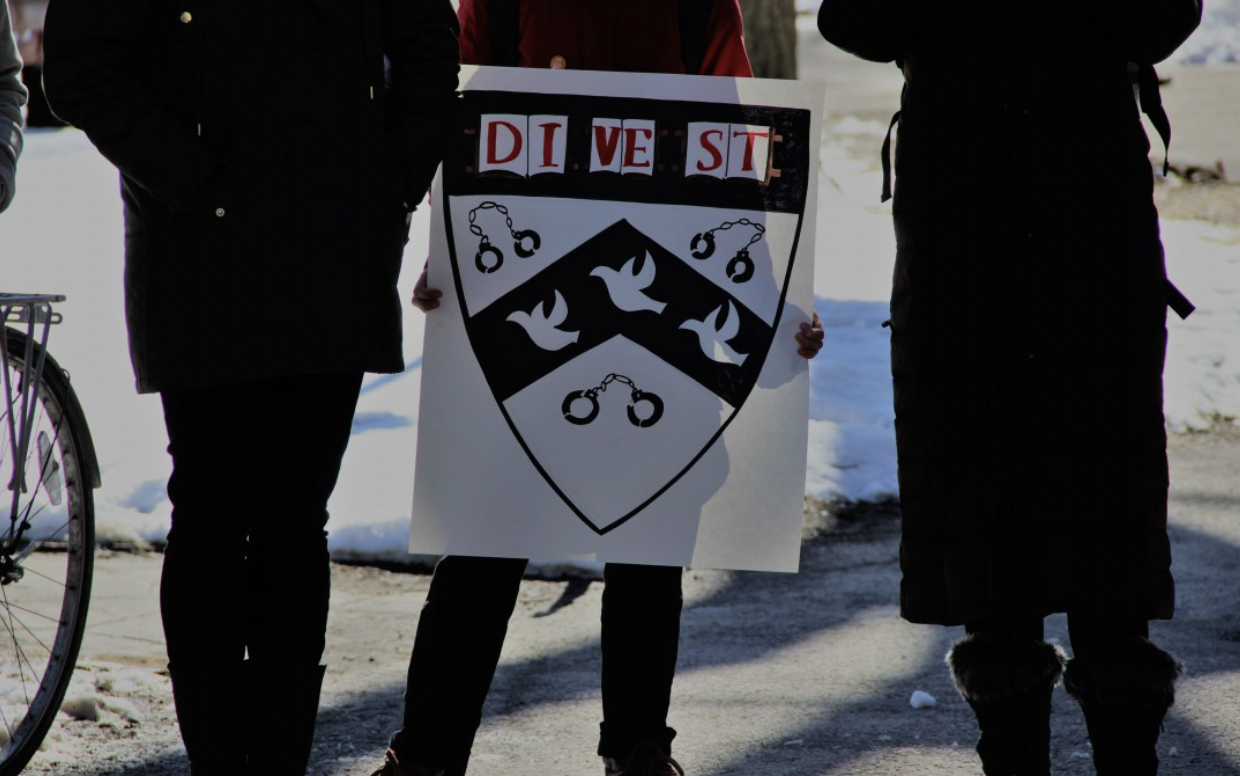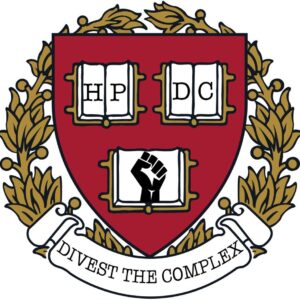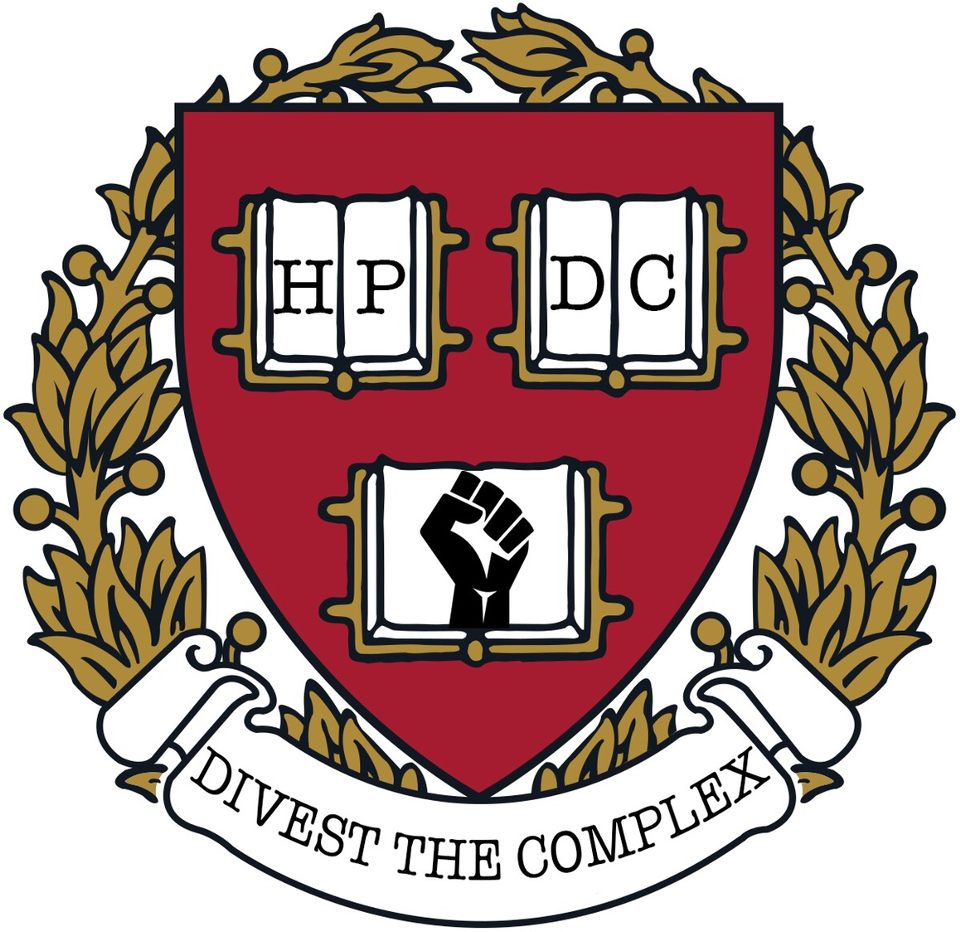
OFFICIAL STATEMENT: “Civil Discourse” is a Cop-Out Answer
On April 4th, student organizers from the Harvard Prison Divestment Campaign (HPDC) joined in coalition with students from Divest Harvard, a group dedicated to pushing Harvard to divest its endowment from fossil fuels, to disrupt an event at the Institute of Politics JFK Jr. Forum. At the forum, Harvard President Larry Bacow was scheduled to speak with Graduate School of Education Dean Bridget Terry Long about the role of the university in advancing economic opportunity. Student protestors from our two movements successfully shut the event down, forcing Bacow and audience members to relocate the conversation to an alternate location. This action marks a necessary escalation of our collective effort to highlight to Larry Bacow and the Harvard community at large the importance of divesting from deeply repugnant and ethically unjustifiable industries.
After students occupied the stage with signs that called attention to Harvard’s unethical investments in corporations that destroy individuals, communities, and our planet, student protestors in the audience began chanting “Disclose, Divest or this movement will not rest!”. Addressing the student protestors, Larry Bacow restated something he has said in response to our campaign in the past: “I respond to reason, not pressure”. It is in direct response to this claim, which Larry Bacow has repeated several times, that we are publishing this statement today.
For the past few months, the Harvard Prison Divestment Campaign has sought to engage the university president on numerous occasions with the intention of discussing the harm in profiting from prisons. On November 1st, 2018, HPDC hosted a community forum about divestment from the prison-industrial-complex (PIC). Upwards of 200 people attended, becoming part of an important conversation between students, faculty, currently and formerly incarcerated people, and community members about Harvard’s role in funding the PIC. Larry Bacow and several members of the Harvard Management Corporation were invited to attend the event. These invitations were met with no response.
In February, organizers with HPDC met with Bacow during his office hours. Office Hours are only available to students twice per semester. This naturally creates immense demand amongst students for time with the University President. Our organizers raced against the clock to register and we were only allotted two ten minute slots. Given the gravity of these issues, it is no surprise that this was not enough time to outline the plethora of reasons that divestment is an imperative. Despite making a compelling case for divestment from the PIC within such a short time, we were met with Bacow’s mantra: “I respond to reason not demands. ” In other words, his stance demonstrated that any kind of engagement from our group, even what would be characterized as “reasonable dialogue”, would be considered hostile and combative.
Also in February, HPDC launched a petition calling on Harvard to divest from the PIC. The petition clearly stated our demands. We want the university to disclose and divest its endowment from prisons and reinvest it in communities. Over 3,400 people signed our petition, and we submitted it to President Bacow at a rally on on March 1st, attended by about 200 Harvard affiliates and community members. Bacow refused to receive the petition or acknowledge us, brushing off thousands in support of our cause.
Yet, despite these efforts, Bacow has portrayed our demands as “irrational” and “uncivil, a framing that has been used repeatedly to silence people of color, and specifically women of color, making valid political critiques. The racial undertones of Bacow’s claim that our protest represented an affront to “reasoned discourse” should not be overlooked. Our campaign is not uncivil, the system of racialized violence that Harvard benefits from is uncivil– it is violent! Through the framing that Bacow has articulated, our campaign is in an impossible position in which any argument we make that honors the urgency of opposing the destructive force of the PIC is viewed as hostile, belligerent, and combative. History is full of examples in which the actions of people of color have been characterized as uncivilized or unreasonable. We will call Larry Bacow’s request for civility as we see it: a common trope used by those in power hoping to silence our voices and the voices of the people behind our campaign that have been directly impacted by the prison industrial complex.
In the face of these repeated dismissive responses from Bacow and the administration, we decided that disruptive protest was necessary. At the forum on April 4th we chanted loudly because thus far our voices have either been ignored or silenced. While Bacow claims that our protest deprived others of free speech, powerful men like Bacow and powerful institutions like Harvard have always been entitled to a voice, a voice that has been consistently denied to people of color and our issues. We will continue to use civil disobedience as civil discourse until our voices are heard and until the university administration commits to a vision for our community that is not financed by the caging of black and brown people. We are inspired in our efforts by the words of the great Dr. Martin Luther King Jr. from his Letter from a Birmingham Jail, “Nonviolent direct action seeks to create such a crisis and foster such a tension that a community which has constantly refused to negotiate is forced to confront the issue.”
In the coming weeks we will be doubling down on our efforts. Today as part of Freedom Campus’ National Day of Action, we will be rearticulating our reasons for divestment in our 2.2 Million Reasons Campaign. We ask that allies and supporters take selfies with a sheet of paper that articulates their reasons for supporting our campaign to divest. We will also continue to hold our Abolition Action Assemblies every Saturday from 1-3pm in the Smith Campus Center Isaacson Room and we ask that allies and supporters continue to show up and show out to create the better Harvard Community we are committed to. Our movement will not rest until Harvard commits to divesting its endowment from the prison industrial complex and reinvesting in communities.



Leave a comment